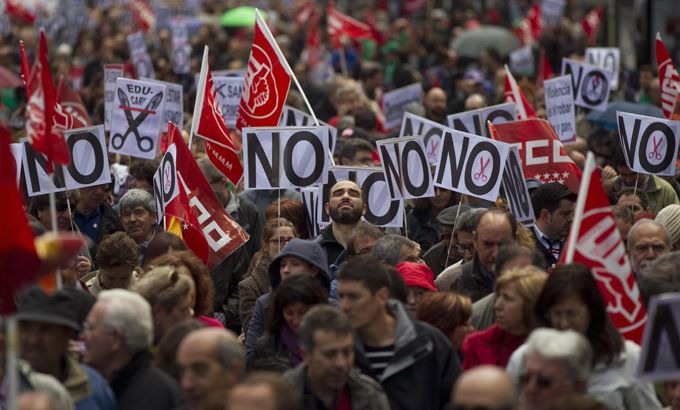Spain’s economic recession double-dips
Latest figures come amid quarterly unemployment data showing nearly 25 per cent of the population as out of work.

Spain’s economic recession has double-dipped in the first fiscal quarter, as the country faces intense pressure from the European Union to solve its financial problems and growing public unrest against austerity measures, new data shows.
The official data was released on Monday amid new quarterly unemployment figures showing nearly 25 per cent of Spaniards are out of work.
Keep reading
list of 4 itemsBoeing hit with 32 whistleblower claims, as dead worker’s case reviewed
US imposes new sanctions on Iran after attack on Israel
A flash flood and a quiet sale highlight India’s Sikkim’s hydro problems
Although the 0.3 per cent contraction from January to March was slightly better than the forecast drop of 0.4 per cent, it confirmed the economy was going through a sticky patch, according to official data.
The release of unemployment figures on Sunday sparked protests, with thousands taking to the streets.
“The wheels are very clearly coming off the economy,” David Owen, an economist, said.
“It wouldn’t surprise me to see a very significant decline in GDP both in the second and third quarters this year, and it’s still reasonably easy to envisage GDP to be down about 1.5 percent this year.”
Spain was last in recession, defined by two straight quarters of economic contraction, at the end of 2009. On an annual basis, the economy contracted by 0.4 per cent, Monday’s data showed.
The government’s latest economic plan, published on Friday before it was sent to the European Commission for approval, forecast a contraction of 1.7 per cent in 2012 turning to 0.2 per cent growth by next year.
Banking crisis
Economists said that the country’s spending cuts aimed at meeting EU deficit limits, together with troubles in the banking sector, would delay any return to growth until late this year or beyond.
It is the second recession in just over two years for the euro zone’s fourth largest economy and came as the government tries to convince investors it would not need financial bailouts like other European countries caught in the debt crisis.
Standard & Poor’s, the ratings agency, added to the country’s problems with a two-notch rating downgrade last week and on Monday it severely cut the credit score.
The banks were damaged by the real estate collapse that began in 2008 and now bad loans in other sectors of the economy have risen sharply.
Raoul Ruparel, the head of Economic Research of Open Europe, a think-tank focusing on the European Union, told Al Jazeera that Spain had to mostly focus on fixing its banking sector in order to improve its economy.
“The Spanish banks simply don’t have the provisions or capital to deal with the losses that may come up on these loans,” he said.
“The most important thing now is putting the capital buffers in place and providing the provisions for the Spanish banks. If that happens, I think a Spanish bailout could be avoided.”